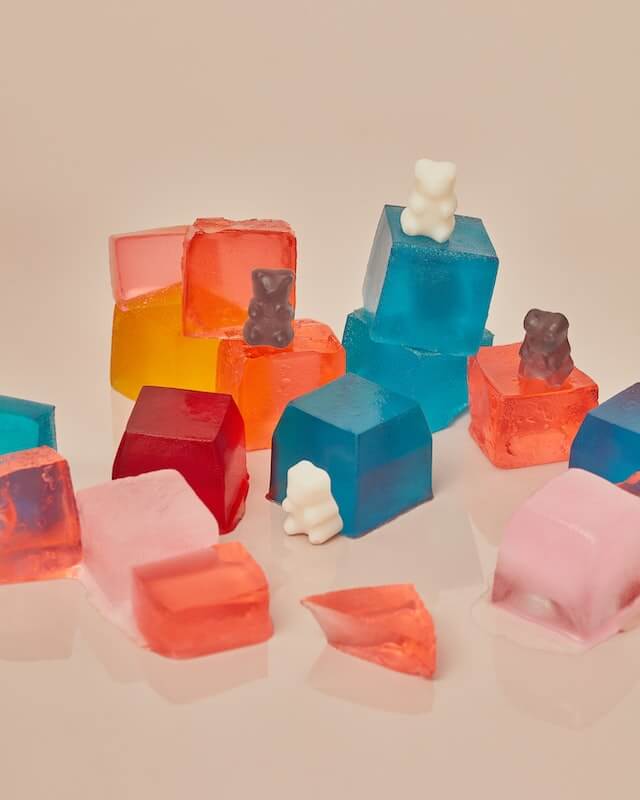Some links on this post may link to affiliate pages that offer compensation to the author of this post.
In the consumer Hemp and CBD space, there is a lot of confusion surrounding the difference between hemp and CBD gummies. You may live in a state that categorizes one as illegal but the other is legal for medicinal use. There may be different effects between both that are important for you to know. So in this article, I am hoping I can answer all your questions on Hemp VS CBD Gummies. If you like this article, please consider sharing it with your friends and family who need some important information about the key differences and how they affect you.
Scientific Explanation of Differences between Hemp and CBD.
Hemp is a specific strain of the Cannabis sativa plant cultivated for its industrial applications, such as textiles, paper, and food. Crucially, hemp contains minimal THC levels (0.3% or less), making it non-psychoactive and legal in many places. On the other hand, CBD, short for cannabidiol, is a compound found in various cannabis plants, including hemp and marijuana. Unlike THC, CBD does not produce a “high” and is renowned for its potential therapeutic benefits, including pain relief, anxiety reduction, and anti-inflammatory properties.
CBD and Hemp are Not Completely Separate Products
It’s important to note that CBD gummies can contain hemp-derived CBD, so they are not mutually exclusive. However, the popularity of CBD gummies can be attributed to the unique benefits of CBD itself, which sets them apart from gummies made solely from hemp extract. As CBD continues to gain recognition for its potential health benefits, the popularity of CBD gummies is likely to grow over time.

Learning the differences between CBD and Hemp
Definition and Characteristics of Hemp
Hemp, scientifically known as Cannabis sativa L., is a versatile plant that has been cultivated for thousands of years for various industrial applications. Unlike its psychoactive counterpart, marijuana, hemp is bred to contain extremely low levels of THC (tetrahydrocannabinol), the compound responsible for the “high” associated with cannabis use. In many countries, hemp is legally defined as a cannabis plant containing no more than 0.3% THC. This minute THC content ensures that hemp does not induce intoxication or alter one’s mental state.
Hemp boasts remarkable qualities, making it an invaluable resource in different industries. The plant’s sturdy fibers are used to produce textiles, ropes, and building materials. Hemp seeds and oil are rich sources of essential nutrients, including protein, omega fatty acids, and vitamins, making them highly sought after in the health food sector. Additionally, hemp has found applications in skincare, with hemp-derived products becoming increasingly popular for their potential benefits to the skin.
Cannabidiol (CBD): Explaining Its Origin and Properties
Cannabidiol, commonly known as CBD, is a natural compound found in the Cannabis sativa plant, including both hemp and marijuana varieties. Unlike THC, CBD does not possess psychoactive properties, meaning it does not lead to feelings of euphoria or impairment. This crucial distinction has drawn significant attention to CBD as a potentially safe and non-addictive option for therapeutic use.
CBD is extracted from the plant’s leaves, flowers, and stems and can be consumed in various forms, such as oils, tinctures, capsules, and gummies. It interacts with the endocannabinoid system (ECS) in the human body, a complex network of receptors responsible for maintaining balance and regulating various physiological processes. Through its interaction with the ECS, CBD may potentially offer a range of health benefits, including pain relief, anxiety reduction, anti-inflammatory effects, and even potential assistance in managing certain medical conditions.

CBD Oil and Marijuana Leaf
Key Differences Between Hemp and CBD
The primary distinction between hemp and CBD lies in their properties and uses. Hemp is a specific strain of the Cannabis sativa plant cultivated for industrial purposes, such as textiles, building materials, and food products. It is characterized by its minimal THC content, making it non-psychoactive and legal in many jurisdictions.
On the other hand, CBD is a natural compound found in various cannabis plants, including hemp and marijuana. Unlike hemp, CBD is sought after for its potential therapeutic effects and is commonly used in various forms for health and wellness purposes.
Hemp Products vs. CBD Gummies
Hemp’s Broader Applications: Hemp products, derived from the versatile Cannabis sativa plant, encompass a wide array of offerings beyond CBD gummies. Hemp’s industrial applications include textiles, paper, biodegradable plastics, construction materials, and nutritious foods. Hemp seeds and hemp oil, in particular, are gaining popularity in the health food industry due to their impressive nutritional profile, containing essential amino acids, fatty acids, and vitamins. On the other hand, CBD gummies are specifically formulated to deliver the potential therapeutic benefits of cannabidiol. While they contain CBD extracted from hemp, their focus is primarily on offering the therapeutic properties of CBD in a convenient and enjoyable form.
Concentration of CBD in Gummies vs. Other CBD Products: One crucial consideration when comparing hemp products to CBD gummies is the concentration of CBD. CBD gummies typically contain a pre-measured dose of CBD, which can be beneficial for those seeking precise control over their intake. However, it’s essential to note that CBD concentrations in gummies might be lower compared to other CBD products such as oils or tinctures. Other CBD products may offer higher concentrations of CBD per serving, making them preferable for users seeking stronger effects or those with specific health goals.
Absorption and Bioavailability
How the Body Processes Hemp and CBD Differently: When ingested, hemp and CBD are processed differently by the body. Hemp seeds and hemp-based foods are rich in nutrients, and the body digests them similarly to other food items. However, CBD requires a more complex process for absorption. When CBD gummies are consumed, the CBD molecules must first pass through the digestive system and the liver before entering the bloodstream. As a result, it can take longer for the effects of CBD gummies to be felt compared to other methods like sublingual tinctures or inhalation.
Factors Affecting CBD Absorption in Gummies: Several factors can influence the absorption of CBD in gummies. The presence of food in the stomach during consumption can affect the rate of absorption, as can individual differences in metabolism and gastrointestinal health. Additionally, the quality and formulation of the gummies, including the type of CBD used (full-spectrum, broad-spectrum, or CBD isolate) and the use of additional ingredients, can also impact the absorption and bioavailability of CBD.
 Safety and Legality
Safety and Legality
When delving into the world of hemp and CBD products, safety and legality are paramount considerations.
Safety Considerations when Using Hemp and CBD Products
Side Effects and Potential Interactions: While hemp and CBD are generally considered safe for most individuals, it’s crucial to be aware of potential side effects and interactions. Some people may experience mild side effects such as drowsiness, dry mouth, or changes in appetite. CBD can also interact with certain medications, impacting how they are metabolized by the body. To minimize risks, it’s advisable to start with a low dosage and monitor how the body responds. If taking other medications or having pre-existing health conditions, consulting a healthcare professional is essential to ensure there are no adverse interactions.
Importance of Consulting a Healthcare Professional: Before incorporating hemp or CBD products into one’s wellness routine, it’s prudent to consult a healthcare professional, especially if one has existing health conditions or is taking medications. A qualified medical professional can provide personalized advice, taking into account individual health needs and potential risks. They can also help determine appropriate dosages and recommend suitable products based on the intended use.
Legal Status of Hemp and CBD Gummies
Federal Regulations in the US and Other Countries: The legal status of hemp and CBD gummies varies by country and region. In the United States, the Agriculture Improvement Act of 2018, also known as the Farm Bill, legalized the cultivation of industrial hemp and removed it from the Controlled Substances Act. As a result, hemp-derived CBD products with less than 0.3% THC are legal at the federal level. However, it’s essential to note that individual states may have their own regulations, and consumers should be aware of local laws.
In other countries, the legality of hemp and CBD gummies may differ significantly. Some nations have fully legalized both hemp and CBD products, while others have more restrictive laws or allow them only for medicinal use. It’s crucial for consumers to research and understand the specific regulations in their respective countries to avoid any legal issues.
Differentiating between Hemp-Derived and Marijuana-Derived CBD: An important aspect of understanding the legality of CBD gummies is the source of the CBD. Hemp-derived CBD gummies are legal in many places, provided they contain less than 0.3% THC. However, marijuana-derived CBD, which contains higher levels of THC, may be subject to stricter regulations or may not be legal in certain areas. To ensure compliance with local laws, it’s vital to verify the source of the CBD used in gummies and the THC content.
My Favorite CBD Gummies
If you are here at the end of the article and curious about giving CBD and Hemp Gummies, here are some affiliate links to some of my favorite CBD gummy companies I recommend you give a look.
Thanks for reading to the end of this post. If you find the information I provide to be helpful, please consider subscribing.
Disclaimer: None of the information presented on this site constitutes legal, business, tax, or medical advice. In each scenario, it’s recommended to first chat with a medical, legal, business, or tax professional before making any decisions.


